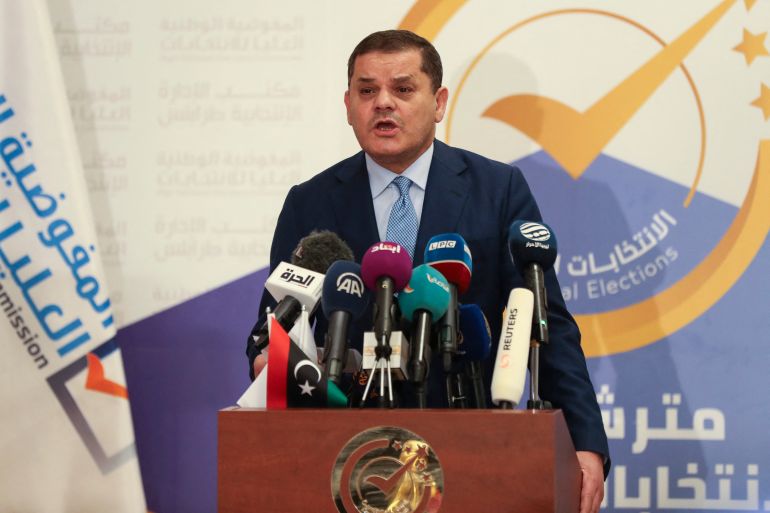Interim leader Abdul Hamid Dbeibah to run for Libyan presidency
Interim Prime Minister Abdul Hamid Dbeibah submitted his application to run for president despite being barred and previously promising not to run.

Libya’s interim prime minister Abdul Hamid Dbeibah has filed an application to run for president in the country’s elections next month despite being barred and previously pledging not to.
Dbeibah is meant to head Libya until a winner is announced following the presidential election on December 24. He submitted his application one day before the November 22 deadline.
Keep reading
list of 4 itemsAguila Saleh: Who is Libya’s house speaker?
NGOs condemn ‘rescue gap’ as 10 migrants die on boat off Libya
Gaddafi, Haftar poll run: democratic progress or return to chaos?
The 63-year-old businessman from Misrata promised he would not run in the elections as a condition to taking on his caretaker role earlier this year. For him to be eligible, Dbeibah also would have needed to have suspended himself from governmental duties at least three months before the polling date, which he did not do.
“I present my candidacy papers, to serve you and not for anything else, for the upcoming presidential elections, and we ask God to help us all for the good of the country and the good of this great nation and this great people,” he said during a news conference after submitting his request to the electoral commission.
“Despite all the accompanying difficulties and ambiguous circumstances that accompanied the election journey, I invite you to never lose hope, as it has become clear, and obvious. The beginning of the right path.”

Parliamentary and presidential elections were demanded by a UN political forum last year as part of a roadmap to end Libya’s civil war, a process that also led to the formation of Dbeibah’s interim unity government.
Dbeibah’s appointment to the premiership nine months ago was confirmed despite allegations of corruption at meetings of the UN-picked 75-member political dialogue forum that appointed him. The interim leader denied the allegations.
His government was meant to replace the rival administrations based in east and west that had ruled Libya for years.
The electoral commission and Libyan courts are likely to rule on the eligibility of candidates in the coming weeks.
Continuing civil war
Libya has remained politically unstable since a 2011 NATO-backed uprising toppled longtime leader Muammar Gaddafi, who was later killed.
The oil-rich nation has for years been split between a government in the east, backed by the renegade commander Khalifa Haftar, and a UN-brokered administration in Tripoli, aided by Western-based Libyan armed groups.
Each side has also had the support of foreign forces and mercenaries including from Russia, Turkey and Syria.
Other candidates set to run in the elections include Gaddafi’s son Saif al-Islam Gaddafi; Haftar, who commands the Libyan National Army (LNA), which waged war on factions in the west after the country split in 2014; and Speaker of Parliament Aguila Saleh, who has led Libya’s House of Representatives since 2014.